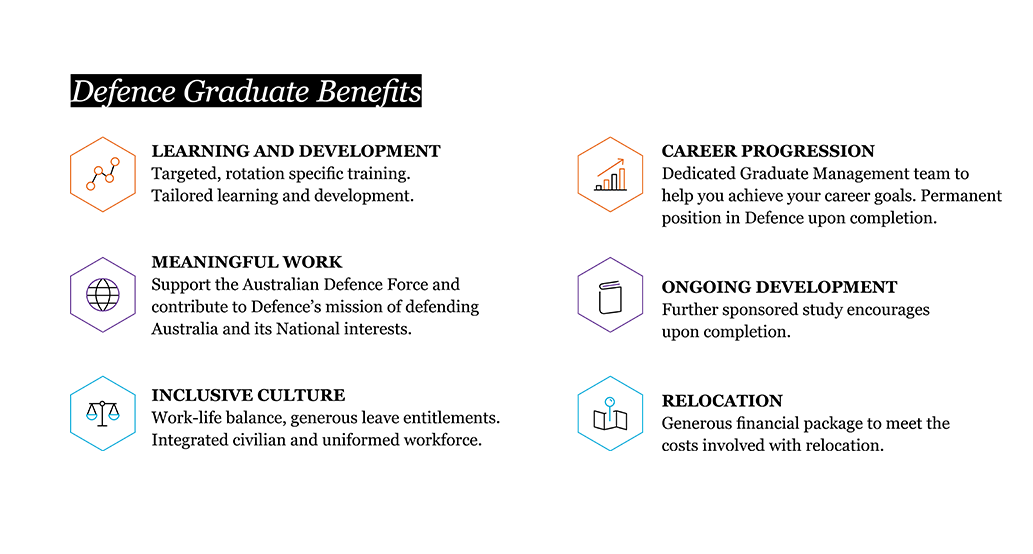Department of Defence
Defence Graduate Program – Australian Signals Directorate
Opportunity expired
Opportunity details
- Graduate Job or Program
- $68,442 pa + 15.4% superannuation. Upon successful completion of the program, graduates will advance to APS 4: $76,215 pa + 15.4% superannuation.
- 120 vacancies
- Apply by 18 Apr 2020

The Australian Signals Directorate (ASD) is a vital member of Australia's national intelligence community. Our motto, Reveal their secrets. Protect our own, summarises our roles: we collect foreign intelligence by interception; we provide advice and assistance on cyber security to make Australia the safest place to connect online; and we conduct offensive cyber operations in support of the Australian Government and Australian Defence Forces (ADF). We are looking for graduates from almost every discipline to work in analyst, technologist or corporate roles.
To achieve its mission, ASD requires people with strong integrity and a mix of specialist skills, adaptability, imagination, resilience and creativity.
These abilities are needed to out-think and out-imagine some of the most testing adversaries and problems imaginable. If you want to work with other smart, skilled people, consider ASD.
You will receive training in our specialised systems and enjoy working in multidisciplinary teams. You may have opportunities to travel domestically and internationally. You will be encouraged and supported to continually develop your skills to keep pace with evolving priorities and technologies. We are committed to the growth of our most important resource – our staff.
Diversity powers ASD's mission. Our work is challenging, and experience shows that the best teams contain clever people with different life experiences.
All civilian roles in ASD are flexible and accommodate part-time or full-time working arrangements.
We are looking for graduates from almost every discipline to work in analyst, technologist or corporate roles.
As an analyst, you can undertake a diverse range of complex tasks – from foreign language analysis to data analysis. Your role will vary, depending on your skills and the role of your team in supporting either ASD's foreign intelligence, cyber security or offensive cyber operations mission.
As a technologist, you can work in areas as diverse as software development, database administration, system design, architecture, testing and maintenance through to cyber security roles including reverse engineering, forensic analysis and intrusion detection. You could have the opportunity to build and maintain everything from secure workstations to high-end supercomputers or develop innovative tools to enable our offensive cyber operations.
Working in corporate roles, you will have the opportunity to develop and shape ASD's future. We have roles in business management, communications, governance, finance, people management, policy, security and recruitment just to name a few.
You will have the opportunity to rotate through different roles to find the best fit for you.
Quick Details
Salary: $68,442 pa + 15.4% superannuation. Upon successful completion of the program, graduates will advance to APS 5: $76,215 pa + 15.4% superannuation.
Program: 12 months - 3 x 4 month rotations
Eligibility: Australian Citizens only
Location: Canberra (interstate rotations outside of Canberra are available)
Reviews
They are different every day but I have had the opportunity to draft emails, documents and undertake academic research as part of developing doctrinal policy.
- Document review, editing and drafting. - Handling correspondence for projects - Attending meetings - Stakeholder engagement (both internal and external)
Policy writing, decision making, liaising with other areas of Department . These roles and responsibilities are very rewarding
About the employer

Department of Defence
4.1
1,000 - 50,000 employees
Government & Public Service
Bring your unique skills and experiences to a world of opportunity at Defence.
Pros and cons of working at Department of Defence
Pros
Opportunity to learn and exposure to a vast array of experiences. Sense of pride in working on behalf of the Australian people and for the defence of the country.
The support for learning development opportunities and ongoing exposure to networking opportunities.
The department is very flexible when it comes to hours, including making ample arrangements to work from home if necessary.
I have had the opportunity to draft emails, documents and undertake academic research as part of developing doctrinal policy.
They are supportive and are good mentors in teaching the internal procedures that otherwise would not be shared if not directly exposed to them.
Cons
Workplace culture is heavily dependent on the dedication of the supervisors and senior leaders which varies depending on the work area.
When all workplace employees are working on-site there is often a shortage of desks which is inconvenient for all involved.
Can be very slow to hear updates.
There is a good mix of women, ethnic minorities, etc., but this seems to be very aggregated in certain groups/services—not so much integrated or dispersed across the department.
I am unsure of my current knowledge or capacity to comment on their sustainability efforts.